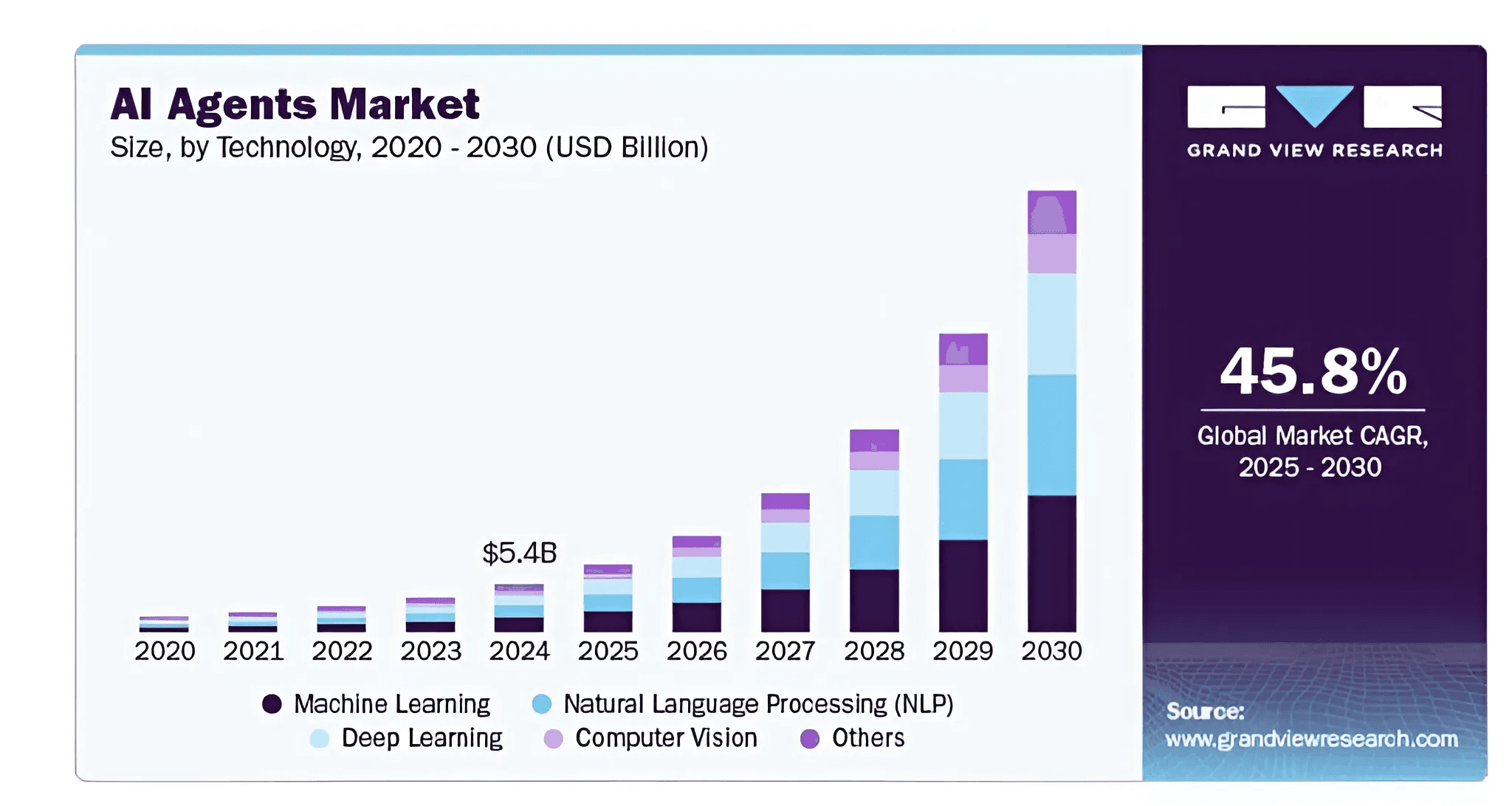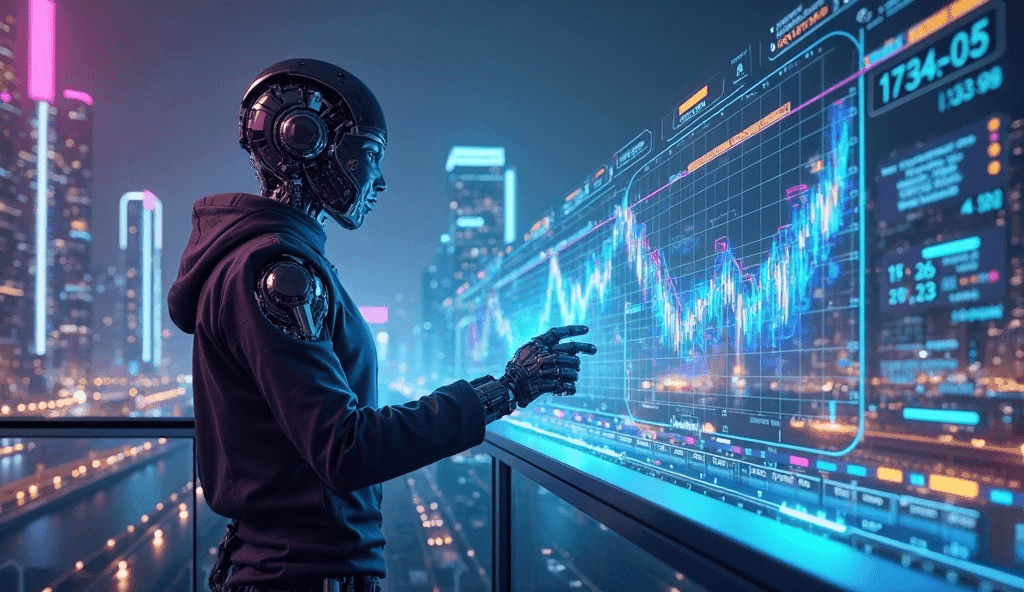How Level 3 AI Agents Could Transform DeFi—And What’s Holding Them Back
Feb 22, 2025
As artificial intelligence advances, Level 3 AI agents are emerging with greater autonomy and adaptive learning capabilities. These innovations have the potential to revolutionize decentralized finance (DeFi), enabling AI-driven portfolio management, market analysis, and real-time decision-making. However, despite their promise, widespread adoption remains hindered by security concerns, ethical risks, and the need for regulatory clarity.
The Rise of AI Agents in Crypto
AI-driven automation has gained significant traction in the crypto space, enhancing trading strategies, predicting market movements, and optimizing financial operations. These intelligent systems execute trades, detect patterns, and perform complex financial tasks with minimal human intervention.
The growth of AI-powered crypto tools is reflected in their rising market capitalization. According to CoinMarketCap, the total valuation of AI agents in the industry now exceeds $13.5 billion. Globally, the AI agents market was valued at $5.40 billion in 2024, with projections indicating a compound annual growth rate (CAGR) of 45.8% between 2025 and 2030.

What Are Level 3 AI Agents?
Level 3 AI agents represent a new frontier in artificial intelligence, offering independent learning, long-term memory retention, and real-time decision-making. Unlike traditional AI models that rely on predefined workflows, these agents refine their strategies through continuous experience, mirroring human-like cognitive functions.
How Level 3 AI Differs from Previous Models
James Ross, founder of Ethereum Layer-2 network Mode, highlights that most existing AI solutions depend heavily on human guidance. However, Level 3 AI agents function with minimal intervention, adapting to new conditions dynamically.
“Level 3 agents can make independent decisions based on richer context and real-time data,” Ross explained. “They retain long-term memory, allowing them to apply past experiences, user preferences, and external factors to future decisions.”
Unlike earlier AI models, which followed static algorithms, Level 3 AI agents refine their decision-making through pattern recognition and autonomous adaptation. These systems process multiple data types—text, images, audio, video, and live market inputs—leading to more sophisticated financial strategies.
AI Agents in the Crypto Industry
With their ability to analyze trends and execute complex strategies, Level 3 AI agents are poised to impact various sectors within the cryptocurrency industry.
Jessica Salomon, an advisor to Chirper.Fun’s Level 3 AI Launchpad, believes these agents will enhance user interaction within crypto.
“The key transformation will be the shift from transactional to relationship-based interactions, where AI agents function as true users rather than just tools,” she said.
Earlier AI models were primarily used for tasks such as automated trading, market monitoring, and executing smart contract functions. However, their reliance on static models made them less effective in rapidly changing markets.
In contrast, Level 3 AI agents can refine their models in real-time, analyze subtle market patterns, and proactively adjust strategies instead of merely reacting to fluctuations.
How Level 3 AI Agents Could Revolutionize DeFi
One of the most promising applications of Level 3 AI agents lies in decentralized finance. By autonomously managing portfolios, lending strategies, and liquidity pools, these agents could transform how DeFi operates.
Ross emphasized that Level 3 AI agents have the potential to execute complex DeFi strategies without human oversight.
“For example, an AI agent could detect an impending market downturn and proactively reallocate assets, interact with DeFi protocols, or trigger hedging strategies—all without human intervention,” he explained. “This level of real-time, adaptive decision-making surpasses current AI models, which are typically confined to predefined rules.”
Already, some DeFi platforms are leveraging AI-driven automation. Mode, for instance, enables DeFi AI agents to actively move assets on-chain, outperforming traditional human-led trading strategies.
Similarly, Velvet Capital, a DeFi asset management protocol, recently launched its “AI Agent Portfolio Launchpad,” allowing investors to create AI-driven portfolios with automated trading strategies.
The Future of AI in Decentralized Autonomous Organizations (DAOs)
Beyond DeFi, Level 3 AI agents are also expected to play a crucial role in decentralized autonomous organizations (DAOs).
Ilan Rakhmanov, founder of ChainGPT, pointed out that many DAOs still rely heavily on human decision-making, which can slow governance processes and create inefficiencies.
“In the future, AI agents could analyze market conditions in real time, manage treasury funds based on on-chain and off-chain data, and even negotiate with smart contracts,” Rakhmanov predicted.
NEAR Protocol has already begun leveraging AI-driven automation through its “Shade Agents,” which extend trust-minimized smart contracts to off-chain AI agents.
According to Kendall Cole, co-founder of Proximity Lab, Shade Agents could introduce new DeFi applications by removing human intermediaries entirely.
“For example, there are teams building index token agents that trade major Layer-1 tokens cross-chain based on market sentiment,” Cole explained. “We’re also seeing prediction market agents that create and settle markets, and gaming AI agents that execute transactions on behalf of users.”
Challenges Holding Back AI Adoption in DeFi
Despite the exciting potential of Level 3 AI agents, several challenges must be addressed before they achieve mainstream adoption in DeFi.
Ethical and Privacy Concerns
Salomon pointed out that AI-driven long-term memory and predictive analytics raise ethical concerns, particularly regarding user privacy and emotional manipulation.
“Ensuring AI agents maintain consistent behavior while allowing for evolution is a challenge,” she said. “It’s also critical to develop real-time responses that reflect authentic emotional intelligence rather than scripted patterns.”
Security Risks and Trust Issues
Building trust remains a significant hurdle. Ido Ben Natan, CEO of security platform Blockaid, warned that without robust security frameworks, users may hesitate to entrust AI agents with financial assets.
“To encourage adoption, AI decision-making must be secured,” Ben Natan said. “Our platform is working on solutions to protect AI agents from interacting with malicious assets or executing unauthorized transactions.”
Salomon emphasized that maintaining transparent AI-human boundaries and implementing clear privacy safeguards will be crucial for the industry’s long-term success.
The Path to Mass Adoption
Before Level 3 AI agents can reach their full potential, the industry must focus on trust-building initiatives.
“The immediate priority is demonstrating value in specific use cases while refining security measures and ethical guidelines,” Salomon stated. “Over time, this will pave the way for broader AI adoption in financial markets.”
The Future of AI-Driven Smart Automation
AI is fundamentally reshaping how digital assets are managed, with Level 3 AI agents introducing new levels of adaptability, memory, and predictive decision-making. These advancements are set to redefine investment strategies, offering a balance between technological insights and human judgment.
As AI-driven automation evolves, investors and market participants may need to rethink how they engage with their portfolios. The era of smart, self-learning financial agents is just beginning, and its impact on DeFi could be transformative.

Gold-Backed Stablecoins vs. USD Stablecoins: The Future of Global Digital Currency?

Real-World Asset Protocols Surpass $10 Billion as Tokenization Gains Momentum

Stablecoins Are Rewiring the Financial System

EU Concerns Over US Crypto Policies and Financial Stability

$1.4 Billion Bybit Hack Raises Concerns Over Safe’s Transaction Security

